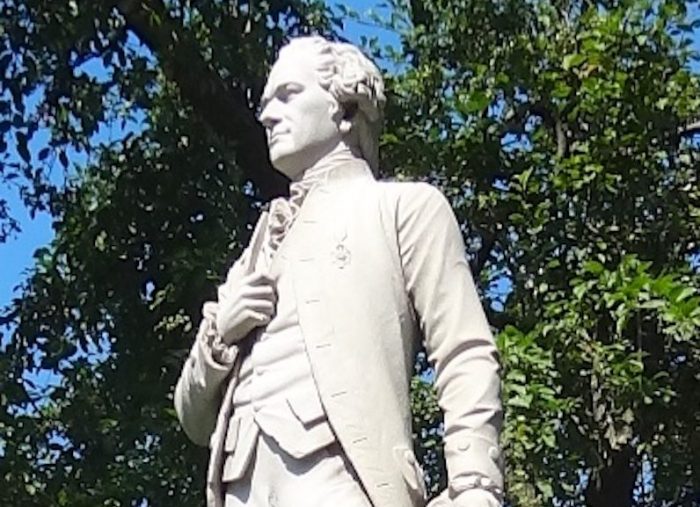Between You and Me: Alexander Hamilton and his wife, Eliza, live on
By Leah S. Dunaief

“What if,” is always a tempting game to play with history. This week in July, thanks to what we learned from the play “Hamilton,” makes us wonder.
What if Alexander Hamilton had not been fatally wounded on July 11, 1804? He died of his stomach wound the next day, yesterday, all those years ago.
He is reputed to have tossed away his shot, but Aaron Burr didn’t.
What if the two men, bitterly at odds over The Jefferson-Burr election for President in 1800, had never had a duel? Even though Hamilton was a member of the Federalist Party along with Burr, still Hamilton campaigned for Jefferson, a member of the Republican-Democratic Party, as having the better character.
What if Burr and Hamilton’s father-in-law, Philip Schuyler, had not opposed each other in the election for New York State Senate? Subsequently, would Hamilton still have said such derogatory things about Burr’s character that prompted Burr to challenge him to a duel?
Hamilton’s oldest son, Philip, was killed in a duel not long before, reportedly defending his father’s honor. Instead, he brought unimaginable grief to his parents. Hamilton is said to have thrown away his shot in turn because of the anguish caused by that killing. What if that great loss hadn’t happened? Would Hamilton have accepted Burr’s challenge, then deliberately missed? After all, Hamilton had been a highly decorated Major General, proficient in battle. He surely knew how to use a gun.
What if Hamilton had lived? After all, he was only in his 40s at the time of his death. Hamilton had been of enormous influence, first as an aide-to Camp for George Washington, then in writing most of the Federalist Papers and helping to get the Constitution passed, again as the United States first Secretary of the Treasury and setting up the national banking system that still exists today during Washington’s administration. (Perhaps less known, to get the Southern members of the Congress to vote “aye,” he agreed to their demand to move the Capital from Philadelphia to Washington, DC, a far easier destination for them.)
Hamilton is regarded today as a brilliant visionary and one of the most outstanding men of his century, at least according to the French diplomat Talleyrand in 1794. His life and thoughts have spanned three centuries. What more might he have given us had he lived?
What if?
His wife, Elizabeth, known as “Eliza,” lived to age 97 and is saluted for her remarkable contributions to the young nation.
Initially left with young children, a mortgage and bills, she was to additionally suffer the loss of her father, who had at the time of his death lost his fortune.
With the help of friends, she was able to hold on to her home but eventually was forced to move her family to lower Manhattan from her 35-acre estate in Harlem. Her children were well-educated and went on to impressive careers.
Eliza became co-founder and director of New York City’s first private orphanage in the area now just south of Columbia Presbyterian Hospital. She remained in that role for 27 years, during which time she oversaw 700 children. She also was a founder of the Orphan Asylum Society. Throughout her life, she remained sensitive to the plight and the needs of orphaned children, reflecting the world her husband had grown up in.
Eliza also was dedicated to preserving her husband’s writings and legacy, including the purchase of his work by Congress. This is how we know so much today about his life and thoughts. His writings are in the Library of Congress.
We might play, “What if,” at any turn in history, some of which could send shivers down our spines. This week, though, it seemed clearly Alexander Hamilton’s turn. He did much to create the world we live in today.







